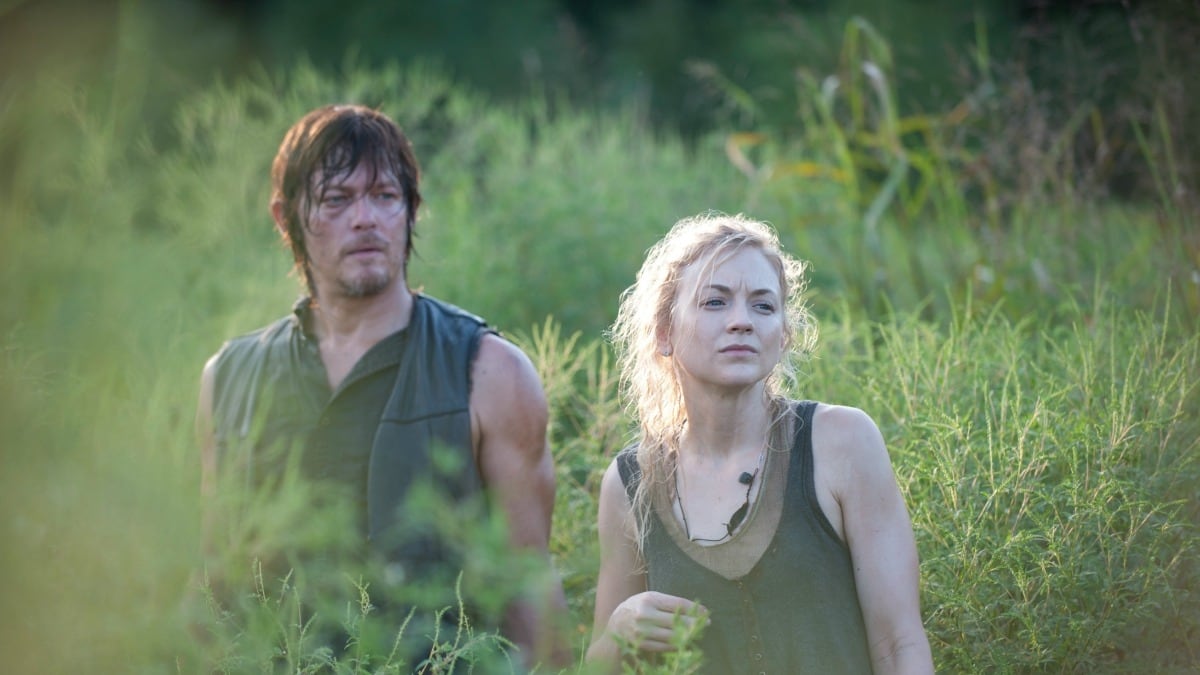When the credits roll after “Still,” there are going to be a few whiners. There will be people who complain that “nothing happened” or that, without Abraham, Rick, or Michonne, it was a boring episode. They’ll be wrong.
It was a perfect episode.
“Still” had everything that a compelling Walking Dead episode should have. It gave its characters meaningful exchanges that went beyond, “Life with zombies is hard—but we must carry on!” It dived into their pre-apocalypse backgrounds, their vices and issues with class. It featured some of special effects master Greg Nicotero’s spookiest work this season, with a country club that felt palpably haunted and Rich Bitch, a darkly funny and memorable corpse.
But what really set “Still” apart was the genius decision to focus on two—rather than ten—people for the length of the entire episode. (That is, two people who are not Rick and Carl.) The result was a previously neglected character, Beth (Hershel’s pretty, Tom Waits-loving daughter), is now suddenly an interesting, relatable, three-dimensional human.
Daryl and Beth—two characters that, before the midseason finale, had probably said all of fifteen words to each other—are stuck together in the aftermath of the prison’s destruction. Neither has any idea whether the rest of the group is alive or dead, but Daryl’s resolve to be as depressed as possible gives us the impression he’s a glass-half-empty guy. Beth, who just watched the Governor murder her dad a few days ago, is left to take on the role of motivator.
This is not a new dynamic. Someone on The Walking Dead is always feeling down about this whole apocalypse thing and, without fail, someone else is there to try and cheer them up. Usually, Beth would say some inspirational, tough-love words, they’d battle a horde of walkers together, he would remember the value of life, and then they’d move on together by episode’s end. Not so in “Still.” Faced with a moping, stony-faced new partner, Beth did not selflessly set aside her own pain to help. Beth told Daryl he was being stupid then went to find herself a drink. In other words, Beth, hero of the people, actually did what a real person might have done.
Walking Dead characters are not the easiest to relate to. They are rarely selfish and any real vices, like Hershel’s or Bob’s alcoholism, are briefly touched upon then almost never mentioned again. So for a teenage girl, previously characterized only by her love of singing and babies, to begin acting like a real teenager (“So what, you’re like my chaperone, now? Yes, Mr. Dixon.”) and go get her drink on was the best thing the show’s writers could have done for her. The girl lost two boyfriends, a brother and both parents to walkers. Yet it wasn’t until she faced with the prospect of having a sad glass of peach schnapps as her first drink that she broke down and had a good cry.
Beth’s hunt for alcohol had bonus results, too. It made Daryl, another routinely heroic character, also morph into a real, flawed adult. Did you know that he’s a douchebag when he’s drunk? Or that he resents people who grew up with money? Or that he thinks that time Beth burst into song at the prison was really, really dumb? Neither did we, until tonight. We saw what sort of home he grew up in and know that his father used to fire guns off inside of it. We heard about the lowlifes he used to hang around with and how rough life with Merle was. All these things make Daryl more than just the cool guy with a crossbow. They make him human.
At the end of the episode, Daryl and Beth burn a house down. They move on, but it’s not because they gave each other a shallow pep talk or because it’s how the episode should end. They move on because that’s what people do—and they’re (fictional) real people, too.





